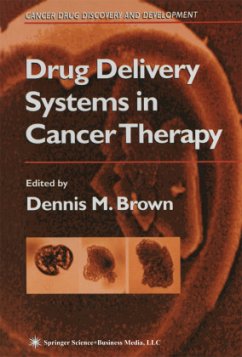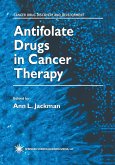Leading experts survey the currently available technologies designed to improve the delivery of today's cancer chemotherapeutic agents. The authors review both the theoretical and practical considerations governing conventional and nonconventional methods of drug administration, and identify promising opportunities for product development. In their outline and discussion of the use of novel formulation technologies-including synthetic polymers and biomaterials for prolonged or sustained drug release to achieve potentially greater therapeutic effect-they profile those technologies that have resulted in a number of approved and late-stage clinical products. A major difficulty in successfully treating cancer with drugs is achieving adequate drug concentrations in the diseased areas without overexposing drug-sensitive normal tissues. In a number of cases, specialized drug delivery systems are required to realize a therapeutic gain. In Drug Delivery Systems in Cancer Therapy, Dennis M. Brown has assembled a panel of leading experts to survey all the currently available technologies designed to improve the delivery of today's cancer chemotherapeutic agents. The authors review both the theoretical and practical considerations governing conventional and nonconventional methods of drug administration, and identify promising opportunities for product development. They also profile the use of novel formulation technologies-including synthetic polymers and biomaterials for sustained drug release to achieve greater therapeutic effect-that have demonstrated efficacy in a number of approved and late-stage clinical products. They also consider the benefits of, and future opportunities for, various drug delivery systems, as well as the experimental techniques used in their evaluation. Although the focus is primarily on small molecule delivery, many of the technologies described can also be effective in delivering larger biomolecules.
Comprehensive, cutting-edge, and highly practical, Drug Delivery Systems in Cancer Therapy captures for experimental oncologists, medicinal chemists, and pharmacologists the universe of approaches, technologies, and systems available for substantially enhancing the therapeutic outcome of anticancer drug delivery today.
Comprehensive, cutting-edge, and highly practical, Drug Delivery Systems in Cancer Therapy captures for experimental oncologists, medicinal chemists, and pharmacologists the universe of approaches, technologies, and systems available for substantially enhancing the therapeutic outcome of anticancer drug delivery today.
"this book should serve as a valuable resource to anyone interested in the field of drug delivery systems in cancer therapy. It would be particularly useful to individuals developing novel agents that might benefit from selective packaging and delivery approaches."-Doody's Health Sciences Book Review Journal "The authors review both the theoretical and practical considerations governing conventional and nonconventional methods of drug administration, and identify promising opportunities for product development." - Tumori "...provide(s) concise and easily understandable clinical significance, current status, and future perspective of anticancer drug delivery." - Pharmaceutical Research








